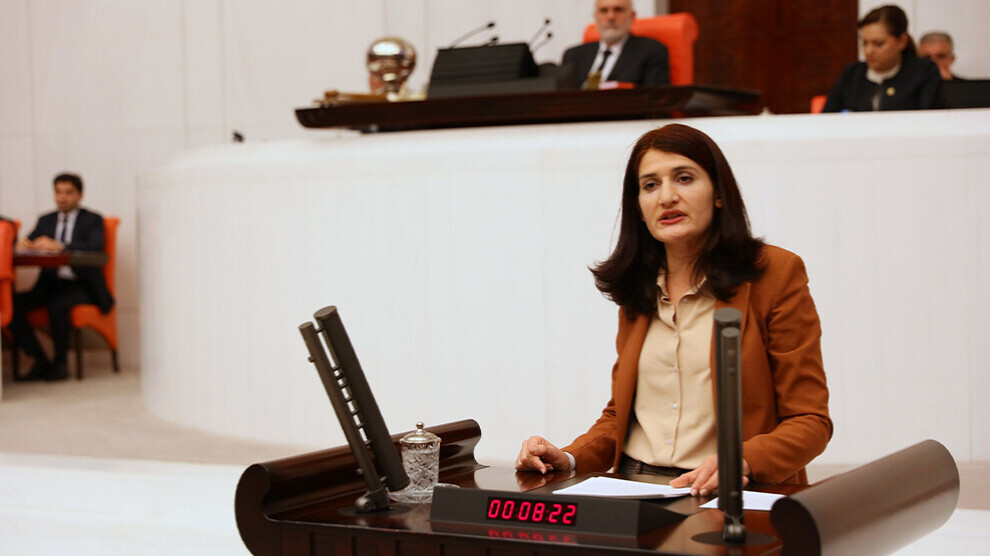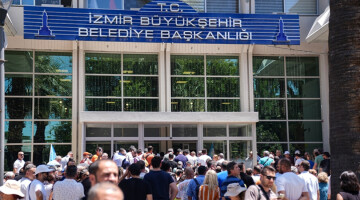HDP MP Semra Güzel risks being stripped of her parliamentary immunity. A corresponding preliminary investigation report from the public prosecutor's office was quickly submitted to the Turkish Ministry of Justice. The preparatory work for this was actually done by a media-intensive and state-controlled defamation campaign against the Kurdish politician and doctor.
At the basis of the investigation are photos taken by the 38-year-old deputy with guerrilla Volkan Bora (Nom de Guerre: Koçero Meletî), who was killed in air raids in Adıyaman in April 2017. The photos were taken in 2014 in a guerrilla camp in southern Kurdistan, during the peace negotiations between the Turkish state and the PKK. The trip there and the visit to Bora, to whom Güzel had been engaged as a student, was, according to the politician, "in the knowledge of the state and its authorities".
However, said the deputy, "although the pictures have been stored in the archives of the security authorities for almost five years, they are only now being published and used as a basis for defamation."
The MP spoke of a “vicious defamation and sexist campaign” being carried out against her as a result of the AKP government's misogynistic policies. She added that she was exposed to "public defamation, social ostracism and lynching." The politician was determined and said that "in any case, this action will have legal consequences for all those responsible and involved."
Proceedings for subversive activities
The preliminary investigation report from the Ankara Public Prosecutor's Office, which includes an application for permission to prosecute Güzel, has been in the Ministry of Justice since Monday. It is unclear which articles the investigation report refers to. However, since only procedures under Articles 301 and 302 are dependent on the authorization of the Minister of Justice, it amounts to a lawsuit for "subversive activities". The President of Parliament Mustafa Şentop spoke out in the National Assembly on Monday in favour of lifting the immunity of MPs “without ifs and buts”.
Güzel faces a long prison sentence if convicted
Article 301 is probably the best known Turkish law in Europe. Until 2008, it regulated "insulting the Turkish nation", but under pressure from the EU, the law was reformed. A violation of the article means prison sentences of between six months and two years. In combination with the anti-terrorist legislation, it often comes to ten times as much. Article 302, on the other hand, which makes "destroying the unity and integrity of the state" a punishable offense, is likely to be the most serious in Turkish criminal law. The text of the law states: "Anyone who places the territorial integrity of the state completely or partially under the sovereignty of a foreign state, destroys the unity of the state, separates part of the state's territory and commits acts that weaken the independence of the state can be sentenced to life imprisonment."
Stripping of immunity to "prevent terrorism"
In May 2016, the Turkish parliament approved a constitutional amendment on "preventing terrorism" initiated by the Islamist Erdoğan party AKP, thus paving the way for the temporary prosecution of MPs. At the time, a total of 154 members of parliament were stripped of their immunity, more than a third of them from the People's Democratic Party (HDP). Immediately after the constitutional amendment, numerous preliminary investigations were launched against members of the opposition. The wave of repression that had started reached its climax on 4 November 2016 with the arrest of ten HDP MPs, including the then party’s co-chairs Figen Yüksekdağ and Selahattin Demirtaş. Observers fear that the case involving Güzel will in reality be used as an excuse to launch a parliamentary initiative for so-called terrorism prevention in order to get the unpleasant opposition out of the way. Dozens of investigation reports aiming at the lifting of parliamentary immunity have been presented against all members of the HDP parliamentary group.












